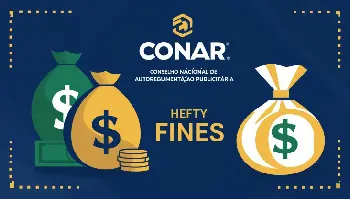Brazil’s Ad Watchdog Slaps Hefty Fines on Betting Brands

February 17, 2025, in São Paulo, Brazil, as the National Council for Self-Regulation in Advertising (CONAR) reported, the local advertising industry has seen unparalleled scrutiny in a year marked by the spread of the controlled betting market in Brazil. With the recent legalization and control of fixed-odds betting, advertising practices have come under close examination, and betting brands are the industry that is punished the most in CONAR's annual reports for 2024.
An Explosion of Betting Advertising
Betting in Brazil was finally legalized, and the betting market started operating after the opening of the regulated market on 1 January 2025. More than 66 betting sites have now been authorized to operate, and the bidding war is about which site gets the most attention. As a result, especially on social media, the newly regulated gambling operators are flooding ads. CONAR is noticing the rampant approach to grab the attention of Brazilian gamers, which has inspired its heightened regulatory response.
CONAR highlighted the need to control the intense advertising environment by issuing 957 notifications on betting advertisements in 2024, a record number for any one sector in one year. A key influence was CONAR's addition of Annex X, a set of guidelines especially designed for advertising on betting platforms. In December 2023, CONAR approved rules on gambling advertising to guard against unethical or misleading campaigns directed at consumers. These include age restrictions, the impact of gambling, and the realism of winning promises.
Penalties and Violations
According to Meio & Mensagem, a Brazilian marketing and advertising portal, CONAR’s report revealed that out of 188 processes completed with fines, no less than 42 were related to betting companies. This figure emphasizes the difficulties and learning curve for brands negotiating Brazil's new advertising rules for gaming. Types of common violations included:
- Misleading representations of winning probabilities.
- Failure to communicate age restrictions and gambling risks.
- Advertisements declared too appealing to young people or those from vulnerable groups.
CONAR's Preventive Unit has aggressively taught advertisers, agencies, and influencers ethical advertising values and punished offenders. This includes particular directions on how to promote betting products responsibly.
The Impact on Betting Brands
The fines imposed on betting brands have affected them differently, depending on their nature. The brands were fined and also had to rebrand or modify their marketing strategies. For some brands, especially those still trying to establish themselves in a recently regulated market, these fines can damage their reputation.
Many companies have had to completely rethink their marketing plans to comply with CONAR's strict compliance guidelines. This can entail deleting commercials, reshooting, or re-posting social media content.
This recent development has also impacted market dynamics. Companies starting to prioritize transparency and consumer education in their marketing campaigns clearly show a move toward more ethical advertising. This is vital in establishing priorities early in the developing sector for consumer protection and responsible gaming. Since the regulatory body is relentless, it also puts new operators on high alert to avoid searching for operating loopholes.
The Broader Context
Concurrent with more significant government initiatives throughout Brazil to guarantee that the gambling industry runs under a structure that supports responsible gaming, CONAR's crackdown fits perfectly. The Secretariat of Prizes and Betting (SPA) has blocked many illegal betting websites, sparking more consumer protection laws to be established.
Public opinion on betting has been divided. Some welcome the new economic prospects, while others worry about the possible social consequences of increased gambling channels. Betting firms now face two difficulties: maintaining rigorous advertising standards while attracting customers in a crowded market.
Looking Ahead
Brazil's betting regulatory environment will probably become even more evident as the market develops. CONAR's emphasis means that penalties could continue to be issued, maybe getting more severe, to guarantee compliance. Additionally, concurrent efforts between CONAR, the government, and betting firms to support more ethical marketing practices could result from a drive toward industry-wide advertising standards. Consumer education is also becoming increasingly critical to guarantee public knowledge of the dangers connected to gambling.
Conclusion
The wave of fines imposed by CONAR on Brazilian betting companies is unmistakable evidence of the challenges linked with a newly controlled sector. As betting companies compete to be the best, a big challenge will be doing so without unethical advertising. This situation tests the adaptability of these companies and the future scenario of gambling in Brazil, which is becoming increasingly responsible and regulated.
